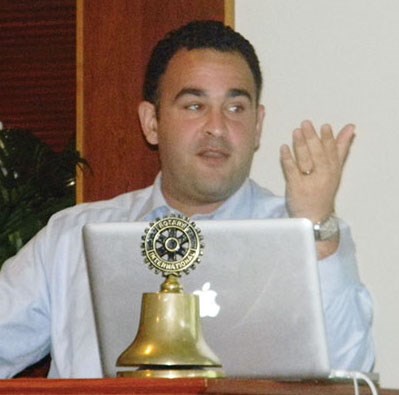There is a third option in the debate over the legalization of marijuana, at least according to one organization.
Jim Stimson of the Little House Society in Tsawwassen recently invited Kevin Sabet of Smart Approaches to Marijuana (SAM) to speak to the Tsawwassen Rotary Club followed by a second talk for invited guests.
Sabet is director of the Drug Policy Institute at the University of Florida, a former White House advisor and co-founder of SAM, an alliance of organizations and individuals promoting a middle ground between incarceration and legalization. He is also the author of Reefer Sanity: Seven Great Myths About Marijuana.
Earlier this year, Stimson joined the founding board of Smart Approaches to Marijuana Canada (SAMC), SAM's first international affiliate.
SAMC was launched in Ottawa in March.
"The project SAM held the same beliefs ... that I personally held inside of me," Stimson said of his reasons for joining the group.
Sabet said the debate in both the U.S. and Canada around whether to legalize marijuana is based on a false dichotomy that there are only two ways to look at the issue - either legalize or criminalize.
"I reject both of these," he said.
"Law enforcement knows that we cannot arrest our way out of drug problems... There's something about drug addiction that affects people's behaviour," he said. "Given that, we need to come up with smarter solutions."
Sabet and SAM are championing a health-first approach that decreases marijuana use yet does not harm users and lower level dealers with arrest records that can lead to a life-long stigma.
"We're not a scare-mongering organization, we're here to present the evidence," he said.
Sabet said one of the myths about marijuana, one touted by many of those who are in favour of legalizing the drug, is that pot is harmless and not addictive. And while Sabet agrees that many can and do use the drug without becoming addicted, he said the chances of becoming addicted, or suffering ill effects from ingesting the drug, increase the younger people start using.
"The adolescent brain is especially susceptible to marijuana use," he said, adding that one in six teens that use the drug become addicted.
That number drops to one in 10 for users who do not start until adulthood.
"I'm concerned about the heavy user and the user who starts young," Sabet said.
He said the myth that marijuana is harmless also stems from the fact the drug has changed a lot since the 1960s and '70s.
In the past 15 years, the potency of pot has tripled and it's increased five fold since 1960, he said, adding much of the research around the effects of marijuana has not been carried out using new strains of the drug.
"I don't believe that we're ready to legalize this drug," Stimson said. "We're not talking about the same drug."
Two American states, Washington and Colorado, recently legalized the sale of marijuana and have already seen an influx of stores selling the drug in various forms, including chocolate bars, candy and pop.
Sabet said the early data from Colorado is just starting to come in.
"It's not looking really pretty at all in Colorado," he said.
The tax revenues are not anywhere close to what was projected, he said, there have been two deaths directly linked to the legalization of marijuana and poison control centres have seen an increase in calls from parents of children who have ingested pot-laced sweets.
"The level of denial, systemic denial, is angering," Sabet said.
Sabet said SAM and SAMC would like to see an increase in prevention, intervention, treatment and overall awareness.
"We want an elevated dialogue without the shouting matches," he said.
"People are ready for a smarter conversation about marijuana that eschews extremes. They want to know the science, not the rhetoric."
Stimson said he joined the SAMC movement because of what he's seen through his work in the field of addiction.
"As a society, we should not be pushing to legalize this drug, maybe ever," he said. "It's not the success that it's built up to be."
Stimson said it's adamantly clear to him that marijuana is a problem in Delta and the problem is on the rise.
"Let's not risk doing any harm until we know more," he said.
For more information about SAM and SAMC, visit www.learnaboutsam. org and www.samcanada. net.



